|
|
|
Sort Order |
|
|
|
Items / Page
|
|
|
|
|
|
|
| Srl | Item |
| 1 |
ID:
160089
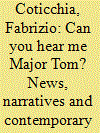

|
|
|
|
|
| Summary/Abstract |
This research explores the relationship between public narratives and the Italian military contribution to the International Security Assistance Force (ISAF) in Afghanistan (2001–2014). Despite attracting little attention in the literature, Italy has been one of the most crucial contributors of multilateral military missions around the world in the post-bipolar era. Italy has remained consistently engaged militarily in Afghanistan over the entire period of the ISAF mission. However, the country’s involvement has been characterised by differing and controversial views and perspectives among Italian political actors and the media. This study aims to reconstruct the core features of the strategic narratives and the media frames around the military intervention and it does so through a Qualitative Content Analysis on a collection of almost 200 articles published by four main Italian national newspapers. The goal of this paper is twofold: on the one hand, we systematically retrace the main discursive patterns and frames employed by the newspapers on the ISAF. On the other, we evaluate whether in the case of military interventions, the Italian media unveil critical inconsistencies and competitive arguments or whether they function as a repeater of the dominant political discourse. Thanks to the case study, we find that the Italian media supported the mainstream narratives.
|
|
|
|
|
|
|
|
|
|
|
|
|
|
|
|
| 2 |
ID:
092312


|
|
|
|
|
| Publication |
2009.
|
| Summary/Abstract |
In the Post-Bipolar Era the growing complexity of the military operations requires a new approach for the resolution of international crises. Since the end of the Cold War, peace support operations (PSO) have become the mainstay and principal occupation of most Western armies. At the same time, Italy has been one of the most important actors in such an area. The article focuses on the cooperation between military and civil components (a process called CIMIC) as a key variable in the Italian PSOs. We will analyse in detail the main lessons learned from past military interventions as well as the general context in which new tendencies are taking place. The maintaining of a minimum security frame becomes essential to fulfil activities 'collateral' to the mission: reconstructing services and infrastructure, food distribution, water and medication, law and order, de-mining, training of local forces, and supporting local institutions. These are the main tasks to obtain thrust and support from the population.
|
|
|
|
|
|
|
|
|
|
|
|
|
|
|
|
| 3 |
ID:
079726
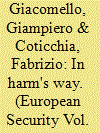

|
|
|
|
|
| Publication |
2007.
|
| Summary/Abstract |
Despite the risk of disastrous outcomes, time and again, advanced democracies have sent their soldiers abroad to dangerous places. They do so not out of necessity (i.e. self-defence), but choice (e.g. humanitarian intervention). What motivates political leaders to accept the risks of such actions? This heuristic study examines three diverse cases in which a medium-sized, advanced democracy, Italy, decided to deploy its troops abroad. It did so because it was both a way to foster its standing in world affairs and a deeply felt, 'moral' commitment to international law. This conclusion can probably be applied to several other democracies such as Germany, Canada or Sweden.
|
|
|
|
|
|
|
|
|
|
|
|
|
|
|
|
| 4 |
ID:
185888
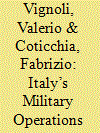

|
|
|
|
|
| Summary/Abstract |
A significant engagement in military missions is probably the most distinctive feature of post-Cold War Italian foreign policy. In the last three decades, Italy has participated in an extensive number of operations across the world, including those in Iraq, Afghanistan, and Libya. Several studies have described Italian troop deployments abroad, providing alternative explanations of the Italian military activism. However, despite a recent growing attention on the topic, mainly focusing on specific peacekeeping operations, a comprehensive investigation of the evolution of Italian interventions is still missing. In other words, a detailed picture of main trends, data and patterns – since the end of the Second World War – is lacking. This article aims to fill this gap, using the most detailed and complete data on Italy’s participation in peace and security operations to date. We show that Italian involvement steadily grew between 1990 and 2010 and decreased in the following ten years. Our empirical findings also indicate how Italy’s efforts were increasingly directed in the Mediterranean and North Africa region in recent years. The article contributes to the existing literature on military operations abroad by offering a broad quantitative perspective on the post-Cold War defence policy of a ‘middle power’.
|
|
|
|
|
|
|
|
|
|
|
|
|
|
|
|
| 5 |
ID:
148252
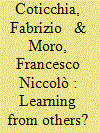

|
|
|
|
|
| Summary/Abstract |
How does military change take place in states that are not able to develop autonomous solutions? How does transformation occur when limited resources are available? What are the “sources of military change” for armed forces that do not possess the (cognitive and material) resources that are essential for autonomous development? In articulating an answer to these questions, this article draws from the theoretical debate on interorganizational learning and looks at the mechanisms that drive “learning from others.” We argue that adaptation and organizational learning often had to look for, and then try and adapt, off-the-shelf solutions that required relatively more limited resources. Empirically, the article focuses on the Italian Armed Forces, which have rarely attracted scholarly attention, although it emerged from almost total lack of activity in the Cold War to extended deployments in the 2000s.
|
|
|
|
|
|
|
|
|
|
|
|
|
|
|
|
| 6 |
ID:
159577
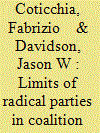

|
|
|
|
|
| Summary/Abstract |
Scholars increasingly suggest that coalition governments produce more extreme foreign policies than single-party governments. Extremity is especially likely when governments include radical parties that take extreme positions on foreign policy issues and are “critical” to the government’s survival, as the radical parties push the centrist ones toward the extremes. A look at Italy’s Second Republic provides an important counterpoint to the extremity hypothesis. In three high-profile cases of military operations—Albania 1997, Kosovo 1999, and Afghanistan 2006–08—Italy had a center-left government that depended on radical parties for its survival. In all cases, the radical parties opposed military operations but did not prevent the government from acting by forcing the government’s fall. Our article seeks to explain the limits of leftist radical parties in Italy’s Second Republic. We argue first that radical parties are reluctant to threaten or force government collapse as this can lead to an opposition coalition coming to office and voters’ being blamed for the outcome. Second, we claim that foreign policy has been less important to radical parties than domestic issues. Finally, we argue that radical parties have appealed to their voters through theatrical politics and have affected the implementation of military operations.
|
|
|
|
|
|
|
|
|
|
|
|
|
|
|
|
| 7 |
ID:
176024
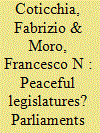

|
|
|
|
|
| Summary/Abstract |
The article contributes to the growing debate on parliamentary war powers and shows how parliaments matter in shaping both force deployment and force employment. Through original analysis of the Italian and German decision-making on military interventions after the Cold War, the article illustrates how formal and informal constraints shape the opportunity structures faced by executives that are willing to undertake military interventions. Revisiting, and building on, the great deal of research recently emerged on institutional constraints to the use of force, the article details the types of costs – namely, transaction and audience costs – linked to involvement of legislatives in the decision-making and provides empirical support for theories based on parliamentary war powers, adding new dimensions of analysis.
|
|
|
|
|
|
|
|
|
|
|
|
|
|
|
|
| 8 |
ID:
159191
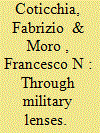

|
|
|
|
|
| Summary/Abstract |
The article explores Italian Air Force (ITAF) officers’ perceptions of military transformation and of changes in the global security environment. While several studies have addressed the challenges faced by European armed forces in the last two decades, the methods used have been rather uniform, mostly relying on in-depth case studies through qualitative interviews and analysis of strategic documents and budgets. Using data from an original, and unique, survey conducted among ITAF captains (N = 286), this article focuses on servicemen’s attitudes towards the transformations of the global security environment and the changes occurring (and needed) within the Italian Air Force. After describing the “military view” on these topics, the article provides preliminary statistical evidence on the links between individual experiences, views, and change. The research aims to contribute to the broader debate on military transformation by adding a novel dimension of analysis and providing new insights on the micro-level aspects of learning.
|
|
|
|
|
|
|
|
|
|
|
|
|
|
|
|
| 9 |
ID:
129976
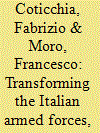

|
|
|
|
|
| Publication |
2014.
|
| Summary/Abstract |
Italian armed forces have undergone important transformations since the end of the Cold War. Exogenous changes in the strategic and operational environment have driven a reshaping of armed forces in all NATO countries, but the differences between the national responses that have emerged has not always been thoroughly analysed. Deep restructuring in military doctrine, field experience linked to intense force deployment and budgetary constraints interact in shaping the direction of transformation, sometimes in ways that deviate from classic hypotheses on what drives change in the military. The picture that emerges is a complex one, where relevant innovations co-exist with the persistence of problems that call into question the sustainability of the Italian defence model.
|
|
|
|
|
|
|
|
|
|
|
|
|
|
|
|
| 10 |
ID:
145095
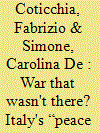

|
|
|
|
|
| Summary/Abstract |
Factors as culture, values, and symbols are crucial to understand the evolution of the Italian foreign and defense policy. However, scholars’ attention to such variables in the study of Italian defense policies still leaves many gaps. Since the end of the Cold War, Italian troops have been constantly engaged in military operations abroad spreading a “peacekeeper image” of Italy in the international arena. The goal of this work is to investigate the features and the evolution of the main strategic narratives adopted by political leaders to interpret the Italian military involvement in Afghanistan. How have politicians crafted strategic narratives on the Afghan mission? How have these story lines influenced public opinion during the conflict? Has the disproportionate gap between the storyline, based on the traditional values of peace and multilateralism, and the war-torn reality on the ground, affected the level of public approval? Or have the ways in which narratives were built in 2009 played a more significant role? In order to answer these questions, this paper relies on polls, content analysis of parliamentary debates, and public discourse analysis (2001–2011).
|
|
|
|
|
|
|
|
|
|
|
|
|
|
|
|
|
|
|
|
|